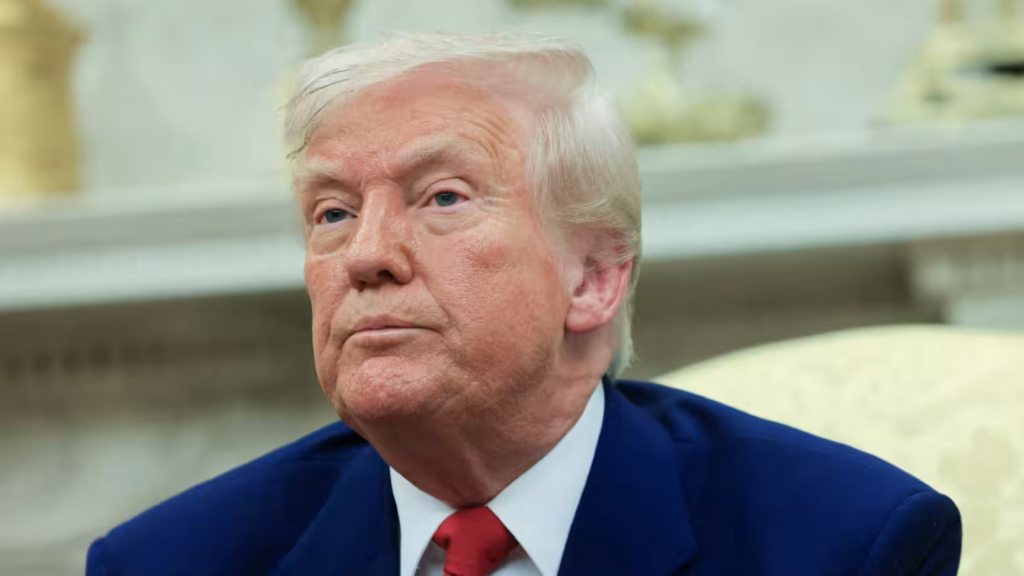China Calls on Trump to Reverse Tariff Policy
China’s Commerce Ministry has issued a sharp rebuke to U.S. President Donald Trump, urging him to “correct mistakes” and abolish steep reciprocal tariffs that have intensified a trade war between the world’s two largest economies.

Labeling recent exemptions for electronics like smartphones and laptops as a “small step,” China called for a full rollback of the tariffs, which currently stand at 145% on Chinese imports, and a return to “mutual respect” in trade relations.
The statement follows Trump’s decision last week to pause reciprocal tariffs for 90 days on most countries, reducing them to a 10% baseline rate, while maintaining and escalating levies on China.
Beijing responded by raising its tariffs on U.S. goods to 125%, signaling a tit-for-tat escalation that has rattled global markets and raised fears of broader economic fallout.
A Renewed Trade War
The latest chapter in U.S.-China trade tensions began earlier this month when Trump announced sweeping tariffs, citing the U.S. trade deficit as a “national emergency.”
On April 2, he imposed reciprocal tariffs on dozens of countries, with China facing a 145% duty building on earlier levies tied to issues like fentanyl trafficking.
Unlike other nations granted a temporary reprieve, China was excluded from the pause, prompting Beijing to retaliate.
On Friday, the Trump administration exempted key tech products, including smartphones, computers, and semiconductors, from the 145% tariffs, a move seen as a concession to U.S. tech giants like Apple, which rely heavily on Chinese manufacturing.
However, Trump later claimed on Truth Social that these exemptions were merely a reclassification under a different tariff “bucket,” creating confusion among investors and analysts.
China’s Commerce Ministry, while acknowledging the exemptions, said it is “evaluating their impact” but remains steadfast in its demand for a complete tariff rollback.
“The U.S. escalation of tariffs is a mistake upon a mistake, severely infringing upon China’s legitimate rights,” the ministry stated, accusing the policy of undermining the global trade order.
Economic Ripples and Uncertainty
The escalating tariffs threaten significant economic consequences. For U.S. consumers, the levies could drive up prices on a wide range of goods, from clothing to electronics, despite the tech exemptions.

American businesses with supply chains in China face heightened costs, while Chinese exporters risk losing access to the lucrative U.S. market.
Read this:
The International Monetary Fund has warned that prolonged trade disruptions could shave 0.5% off global GDP by 2026.
Global stock markets have wavered, with Wall Street ending last week higher but still volatile.
The U.S. dollar and Treasury yields have climbed, reflecting investor concerns about inflation and debt. In China, state media has framed the tariffs as an attack on multilateral trade, rallying domestic support for Beijing’s defiant stance.
International Reaction
The international community has reacted with a blend of concern and cautious diplomacy. Japan welcomed Trump’s tariff pause for most countries but urged the U.S. to reconsider sector-specific levies on steel, aluminum, and cars.
Germany’s incoming chancellor, Friedrich Merz, suggested the pause reflects Europe’s resolve to push back, hinting at potential EU retaliation if talks falter.
The World Trade Organization’s Director-General, Ngozi Okonjo-Iweala, warned that the U.S.-China tariff spiral could “devastate” global trade, calling for urgent negotiations.
Meanwhile, countries like Canada and Mexico, still grappling with USMCA-related tariffs, have initiated trade talks with Washington to secure exemptions.
China has sought to position itself as a stable trade partner, with President Xi Jinping telling Spanish Prime Minister Pedro Sanchez last week that China and the EU should jointly oppose “unilateral bullying.” Beijing’s outreach to other nations underscores its strategy to isolate the U.S. in the trade dispute.
A Fragile Standoff
As both sides dig in, analysts see little immediate prospect for de-escalation.
Trump has hinted at a possible deal with China, praising Xi despite their differences, but Beijing’s rhetoric suggests it is prepared for a prolonged standoff. “China’s leaders aren’t inclined to cave to pressure,” said trade expert Laura Chen. “They’re betting on their economic resilience and global partnerships to weather this storm.”
For now, the world watches as the U.S. and China navigate a high-stakes game of brinkmanship, with the global economy hanging in the balance.


![An ambulance is parked at the site of the Lapu Lapu event in Vancouver [Jennifer Gauthier/Reuters]](https://worldinfo.news/wp-content/uploads/2025/04/Car-Crashes-into-Vancouver-Festival-Kills-Several-554x346.webp) Car Crashes into Vancouver Festival Kills Several
Car Crashes into Vancouver Festival Kills Several  Trump Meets Zelensky, Questions Putin’s Peace Intentions
Trump Meets Zelensky, Questions Putin’s Peace Intentions  Kashmir Tensions Rise After Attack and Border Clashes
Kashmir Tensions Rise After Attack and Border Clashes  Jhelum Water Release Triggers Pakistan
Jhelum Water Release Triggers Pakistan  Barcelona Clinches Copa del Rey Over Real Madrid
Barcelona Clinches Copa del Rey Over Real Madrid  Pakistan Admits ‘Dirty Work’ for U.S., Sparks Global Outrage
Pakistan Admits ‘Dirty Work’ for U.S., Sparks Global Outrage